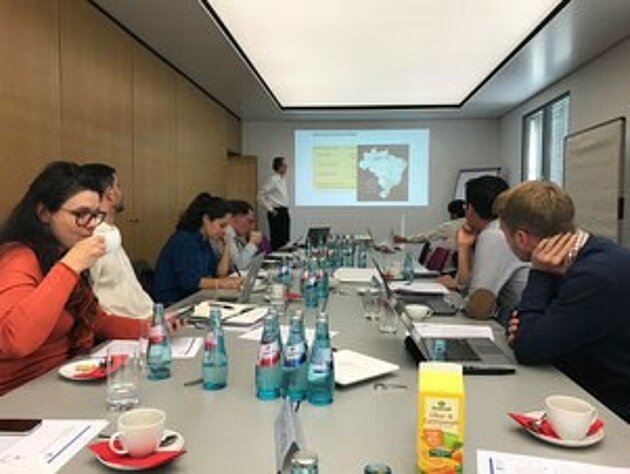Energy and State Capacities in BRIC Countries
Artikel vom 11.09.2017

Internationaler Workshop in Kooperation mit dem Jean Monnet Centre of Excellence „EU in Global Dialogue“ (CEDI)
Beginn: 21.09.2017 | 13:00 Uhr
Ende: 22.09.2017 | 12:30 Uhr
Ort:
Schader-Forum
|
Goethestr. 2
|
64287 Darmstadt
In Google Maps öffnen
International Workshop

The Jean Monnet Centre of Excellence „EU in Global Dialogue“ (CEDI) (Dr. Carlos Santana and Prof. Dr. Michèle Knodt) organized an international Workshop on the topic "Energy and State Capacities in BRIC Countries". The Workshop focused on the question: Which kind of state capacity theory can be produced to explain the meteoric rise of these new emerging economies?
Perhaps one of the most relevant aspects of infrastructure for understanding the state capacity of BRIC countries is energy policy. Energy security is geopolitically important for each of the BRIC and energy prices have been used to cushion social and economic shocks. Brazil, Russia, India and China all share certain traits with respect to their energy supply chain's productive structure.
The study of energy in BRIC countries involves not only an evaluation of the physical infrastructure but also financing and bureaucratic support as important determinants of state capacity. Infrastructure facilities demands large investments which usually exceed budgetary capacities and electoral cycles. Implementation depends less on the government's horizon and fundamentally more on bureaucratic structure and stable financial mechanisms. The comparative political economy literature has emphasized, in conceptual terms, the role of national finance structures and seeks to show the advantages from a system coordinated by policy banks' loans as a useful instrument to overcoming technology lags in production regimes. Such studies have emphasized the role of institutional complementarities among domestic systems of financing, industrial and labor relations, and innovation to describe specific trajectories of development. In general terms, the main goal of this conference is gathering the commonalities in terms of the domestic institutional complementarities among BRIC countries based on analysis of the energy infrastructure of these countries.
For further information please visit: www.eu-global-dialogue.eu/news/
Originaly published under www.eu-global-dialogue.eu/news/
Text by Prof. Michèle Knodt

